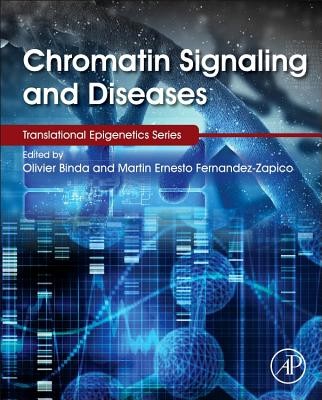
- We will send in 10–14 business days.
- Publisher: Academic Press
- ISBN-10: 0128023899
- ISBN-13: 9780128023891
- Format: 21.8 x 27.9 x 2.8 cm, hardcover
- Language: English
- SAVE -10% with code: EXTRA
Chromatin Signaling and Diseases (e-book) (used book) | bookbook.eu
Reviews
Description
Chromatin Signaling and Diseases covers the molecular mechanisms that regulate gene expression, which govern everything from embryonic development, growth, and human pathologies associated with aging, such as cancer. This book helps researchers learn about or keep up with the quickly expanding field of chromatin signaling.
After reading this book, clinicians will be more capable of explaining the mechanisms of gene expression regulation to their patients to reassure them about new drug developments that target chromatin signaling mechanisms. For example, several epigenetic drugs that act on chromatin signaling factors are in clinical trials or even approved for usage in cancer treatments, Alzheimer's, and Huntington's diseases. Other epigenetic drugs are in development to regulate various class of chromatin signaling factors. To keep up with this changing landscape, clinicians and doctors will need to stay familiar with genetic advances that translate to clinical practice, such as chromatin signaling.
Although sequencing of the human genome was completed over a decade ago and its structure investigated for nearly half a century, molecular mechanisms that regulate gene expression remain largely misunderstood. An emerging concept called chromatin signaling proposes that small protein domains recognize chemical modifications on the genome scaffolding histone proteins, facilitating the nucleation of enzymatic complexes at specific loci that then open up or shut down the access to genetic information, thereby regulating gene expression. The addition and removal of chemical modifications on histones, as well as the proteins that specifically recognize these, is reviewed in Chromatin Signaling and Diseases. Finally, the impact of gene expression defects associated with malfunctioning chromatin signaling is also explored.
EXTRA 10 % discount with code: EXTRA
The promotion ends in 17d.07:35:27
The discount code is valid when purchasing from 10 €. Discounts do not stack.
- Publisher: Academic Press
- ISBN-10: 0128023899
- ISBN-13: 9780128023891
- Format: 21.8 x 27.9 x 2.8 cm, hardcover
- Language: English English
Chromatin Signaling and Diseases covers the molecular mechanisms that regulate gene expression, which govern everything from embryonic development, growth, and human pathologies associated with aging, such as cancer. This book helps researchers learn about or keep up with the quickly expanding field of chromatin signaling.
After reading this book, clinicians will be more capable of explaining the mechanisms of gene expression regulation to their patients to reassure them about new drug developments that target chromatin signaling mechanisms. For example, several epigenetic drugs that act on chromatin signaling factors are in clinical trials or even approved for usage in cancer treatments, Alzheimer's, and Huntington's diseases. Other epigenetic drugs are in development to regulate various class of chromatin signaling factors. To keep up with this changing landscape, clinicians and doctors will need to stay familiar with genetic advances that translate to clinical practice, such as chromatin signaling.
Although sequencing of the human genome was completed over a decade ago and its structure investigated for nearly half a century, molecular mechanisms that regulate gene expression remain largely misunderstood. An emerging concept called chromatin signaling proposes that small protein domains recognize chemical modifications on the genome scaffolding histone proteins, facilitating the nucleation of enzymatic complexes at specific loci that then open up or shut down the access to genetic information, thereby regulating gene expression. The addition and removal of chemical modifications on histones, as well as the proteins that specifically recognize these, is reviewed in Chromatin Signaling and Diseases. Finally, the impact of gene expression defects associated with malfunctioning chromatin signaling is also explored.


Reviews